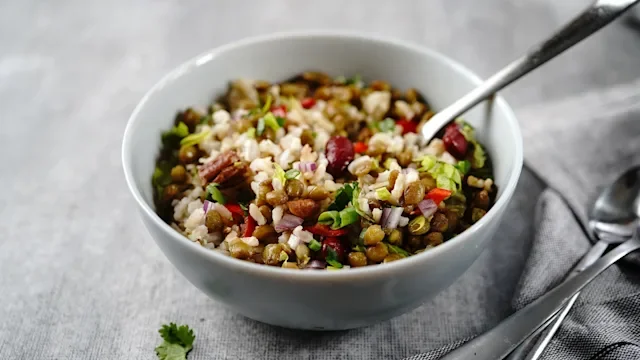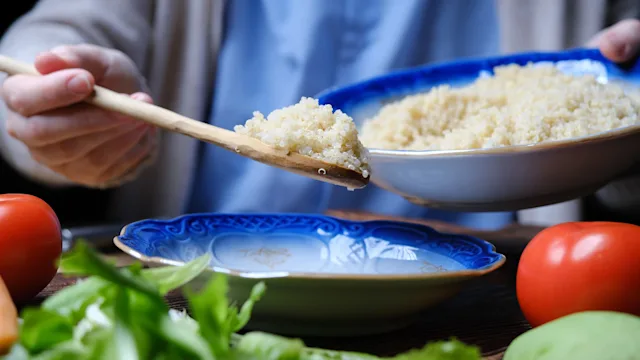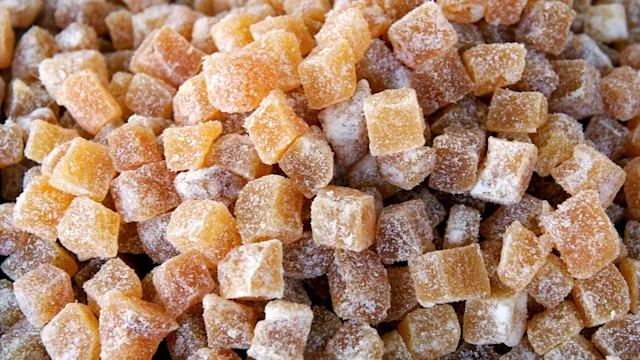Key takeaways:
Eating a diet high in fiber can help with weight loss and keeping weight off.
Fiber may help you lose weight by increasing fullness, curbing your appetite, decreasing calorie absorption, keeping your blood sugar stable, and changing your gut flora.
Fiber supplements can also support weight loss, but getting fiber from the foods you eat may be more effective. You can add fiber to your diet by eating whole grains, fruits, vegetables, nuts, and seeds.
Most people in the U.S. don’t get enough fiber. You should aim to get at least 22 g to 34 g of fiber daily, depending on your age and sex.
Fiber is one of the most talked-about nutrients — and for good reason. Getting enough fiber in your diet can aid digestion, improve heart health, and even lower your risk of cancer. You might have also heard that fiber can help with weight loss.
But is this true? Does fiber help you lose weight? Let’s take a look at what science has to say about the link between fiber and weight loss.
Can fiber help with weight loss?
Yes, fiber can help with weight loss. A diet high in fiber has been shown to help people with excess weight lose weight. And fiber seems to support weight loss regardless of whether your diet is high or low in protein or fat.
A high-fiber diet can also help you keep weight off, since people who eat more fiber tend to gain less weight.
Most of the research on fiber and weight looks at dietary fiber. This is fiber that’s naturally found in foods that you eat. But fiber from supplements also may help with weight loss.
How can fiber help you lose weight?
Fiber supports weight loss in several different ways.
1. Helping you feel full
Eating more fiber can promote satiety (the feeling of fullness) during and after meals. This sense of fullness can be a signal to stop eating. There are a few different reasons fiber can help you feel full:
Physical properties of fiber: Fiber is bulkier and thicker than other nutrients. It also expands more in the stomach.
Slowed digestion: Fiber slows down digestion, which means food spends more time in your stomach.
Impact on hormones: Fiber helps stimulate the release of hormones — like GLP-1 — that lead to feelings of fullness.
2. Lowering your appetite
People who eat more fiber may have a lower appetite overall. This is likely because of fiber’s impact on hormones related to appetite. In one study, women who consumed more fiber had lower levels of the hormone ghrelin an hour later. Ghrelin helps regulate your appetite — lower levels mean you’re less likely to feel hungry.
Why is fiber so good for you? Fiber supports gut health, balances blood sugar, decreases cancer risk, lowers cholesterol, and that’s not all. Learn more about the benefits of fiber.
Soluble vs. insoluble fiber: Each type of fiber has different health benefits, and most high-fiber foods contain a bit of both kinds.
High-fiber foods to add to your diet: Here’s a handy list of some of the top whole grains, fruits, vegetables, beans, nuts, and seeds filled with fiber.
But it’s important to note that eating more fiber seems to support weight loss even when it doesn’t change the amount of calories you consume. So there’s more going on than changing how much you eat.
3. Decreasing calorie absorption
Fiber is a carbohydrate that your body can’t digest. You can think of fiber as a zero-calorie carbohydrate, since the body doesn’t absorb it. So high-fiber meals have fewer calories than their low-fiber counterparts.
High-fiber foods also take longer to chew. Some experts believe that chewing foods longer leads to eating less.
There’s also some evidence that fiber creates a barrier in the gut that blocks the absorption of some calories from food. As a result, fewer calories are absorbed into the bloodstream.
4. Stabilizing blood sugar
Fiber helps to manage blood sugar. It does this by slowing down the absorption of carbohydrates from your gut. After you eat high-fiber foods, your blood sugar rises slowly instead of spiking. High blood sugar spikes can lead to food cravings. So keeping your blood sugar stable after meals may help prevent food cravings.
5. Changing your gut flora
Your gut is lined with trillions of microorganisms that are known as your microbiome. Fiber helps feed the beneficial bacteria living there. It also helps increase the variety of bacteria. Having more diversity of bacteria in your gut is linked to less weight gain.
What are the best sources of fiber for weight loss?
There are plenty of ways to increase fiber in your diet. Some of the best sources of fiber for weight loss include:
Nuts and seeds
Legumes
Some people believe that a diet high in fiber and low in carbs may be especially helpful for weight loss.
How much fiber do you need?
Most people in the U.S. don’t get enough daily fiber. The Dietary Guidelines for Americans (DGA) recommend the following daily fiber intake:
Women ages 18 to 50 years: 25 g to 28 g per day
Women ages 51 and older: 22 g per day
Men ages 18 to 50 years: 31 g to 34 g per day
Men ages 51 and older: 28 g per day
Should you aim for more fiber if you’re trying to lose weight? Maybe. In one study, for every additional gram of daily fiber per 1,000 calories consumed, participants lost an additional 0.5 lb over the course of 20 months. Some weight-loss programs suggest aiming for 40 g of fiber per day.
Can you eat too much fiber?
Yes. Fiber is good for you in many ways. Most adults in the U.S. don’t get enough of it. But it’s possible to get too much of a good thing.
Eating too much fiber can lead to bloating, abdominal pain, and constipation. You may also experience these symptoms if you quickly increase your fiber intake. So if you’re planning to increase fiber, try to do so gradually so your body can get used to it. And be sure to drink plenty of water, since fiber requires water in order to do its job.
Tips for adding fiber to your diet
Adding fiber to your diet doesn’t mean you have to overhaul your entire eating pattern. You can increase fiber in small ways by:
Swapping out refined grains for whole grains
Adding veggies to every meal
Snacking on nuts
Drinking fruit smoothies (add nuts and seeds to bump up the fiber)
Focusing on fruits for dessert
Starting the day with hearty oatmeal
Are fiber supplements good for weight loss?
Fiber supplements haven’t been researched as much as dietary fiber. Most research has found that fiber supplements can help support weight loss.
But dietary fiber from foods may be more effective. This is likely because dietary fiber comes from plant-based foods. And plant-based foods have additional qualities that can support weight loss.
Frequently asked questions
Both soluble and insoluble fiber help with weight loss by curbing appetite and helping you feel full. But soluble fiber is better for weight loss. Soluble fiber — or fiber that dissolves in water — seems to have a stronger effect on weight loss and regulating blood sugar than insoluble fiber. Foods high in soluble fiber include apples, pears, citrus fruits, carrots, broccoli, peas, cucumber, celery, and oat bran.
The DGA recommends getting anywhere from 22 g to 34 g of fiber per day for overall health. But there are no specific guidelines for how much fiber is needed for weight loss. Some experts suggest that if your goal is weight loss, you should aim for 40 g of fiber per day. But even increasing your fiber intake in small ways can positively impact your health.
Both soluble and insoluble fiber help with weight loss by curbing appetite and helping you feel full. But soluble fiber is better for weight loss. Soluble fiber — or fiber that dissolves in water — seems to have a stronger effect on weight loss and regulating blood sugar than insoluble fiber. Foods high in soluble fiber include apples, pears, citrus fruits, carrots, broccoli, peas, cucumber, celery, and oat bran.
The DGA recommends getting anywhere from 22 g to 34 g of fiber per day for overall health. But there are no specific guidelines for how much fiber is needed for weight loss. Some experts suggest that if your goal is weight loss, you should aim for 40 g of fiber per day. But even increasing your fiber intake in small ways can positively impact your health.
The bottom line
Eating more fiber can help support your weight-loss goals. That’s because fiber affects your gut and hormones to lower your appetite, increase fullness, and help regulate blood sugar and sugar cravings. While fiber supplements may be useful, you’re best off turning to fiber from plant-based whole foods. So look for opportunities to add extra fruit, vegetables, whole grains, nuts, and seeds into your daily diet when you can.

Why trust our experts?



References
Abou, S. R., et al. (2007). Insoluble cereal fiber reduces appetite and short-term food intake and glycemic response to food consumed 75 min later by healthy men. The American Journal of Clinical Nutrition.
Akhlaghi, M., et al. (2024). The role of dietary fibers in regulating appetite, an overview of mechanisms and weight consequences. Critical Reviews in Food Science and Nutrition.
Beerman, K., et al. (2019). Dietary fiber: An integral component of a successful weight loss intervention. American Society for Nutrition.
Giutini, E. B., et al. (2022). The effects of soluble dietary fibers on glycemic response: An overview and futures perspectives. Foods.
Huwiler, V. V., et al. (2022). Prolonged isolated soluble dietary fibre supplementation in overweight and obese patients: A systematic review with meta-analysis of randomised controlled trials. Nutrients.
Jakše, B., et al. (2020). Whole-food plant-based lifestyle program and decreased obesity. American Journal of Lifestyle Medicine.
Kelly, R. K., et al. (2023). Increased dietary fiber is associated with weight loss among Full Plate Living program participants. Frontiers in Nutrition.
Lennerz, B. S., et al. (2020). 1773-P: Postprandial hyperglycemia after a high–glycemic index meal activates brain areas associated with food cravings and overeating in T1D. Diabetes.
Menni, C., et al. (2017). Gut microbiome diversity and high-fibre intake are related to lower long-term weight gain. International Journal of Obesity.
Miketinas, D. C., et al. (2019). Fiber intake predicts weight loss and dietary adherence in adults consuming calorie-restricted diets: The POUNDS lost (Preventing Overweight Using Novel Dietary Strategies) study. The Journal of Nutrition.
Papathanasopoulos, A., et al. (2010). Dietary fiber supplements: Effects in obesity and metabolic syndrome and relationship to gastrointestinal functions. Gastroenterology.
Pražnikar, Z. J., et al. (2023). Effects of four different dietary fibre supplements on weight loss and lipid and glucose serum profiles during energy restriction in patients with traits of metabolic syndrome: A comparative, randomized, placebo-controlled study. Foods.
Quagliani, D., et al. (2016). Closing America’s fiber intake gap. American Journal of Lifestyle Medicine.
Taskin, R. R., et al. (2018). Dietary fiber and its effect on obesity: A review article. Advances in Medical Research.
Thompson, S. V., et al. (2017). Effects of isolated soluble fiber supplementation on body weight, glycemia, and insulinemia in adults with overweight and obesity: A systematic review and meta-analysis of randomized controlled trials. The American Journal of Clinical Nutrition.
Triffoni-Melo, A. d. T., et al. (2023). High-fiber diet promotes metabolic, hormonal, and satiety effects in obese women on a short-term caloric restriction. Arquivos de Gastroenterologia.
Tucker, L. A., et al. (2009). Increasing total fiber intake reduces risk of weight and fat gains in women. The Journal of Nutrition.
U.S. Department of Agriculture. (2020). Dietary guidelines for Americans 2020-2025.
Waddell, I. S., et al. (2023). Dietary fiber in the prevention of obesity and obesity-related chronic diseases: From epidemiological evidence to potential molecular mechanisms. Critical Reviews in Food Science and Nutrition.














